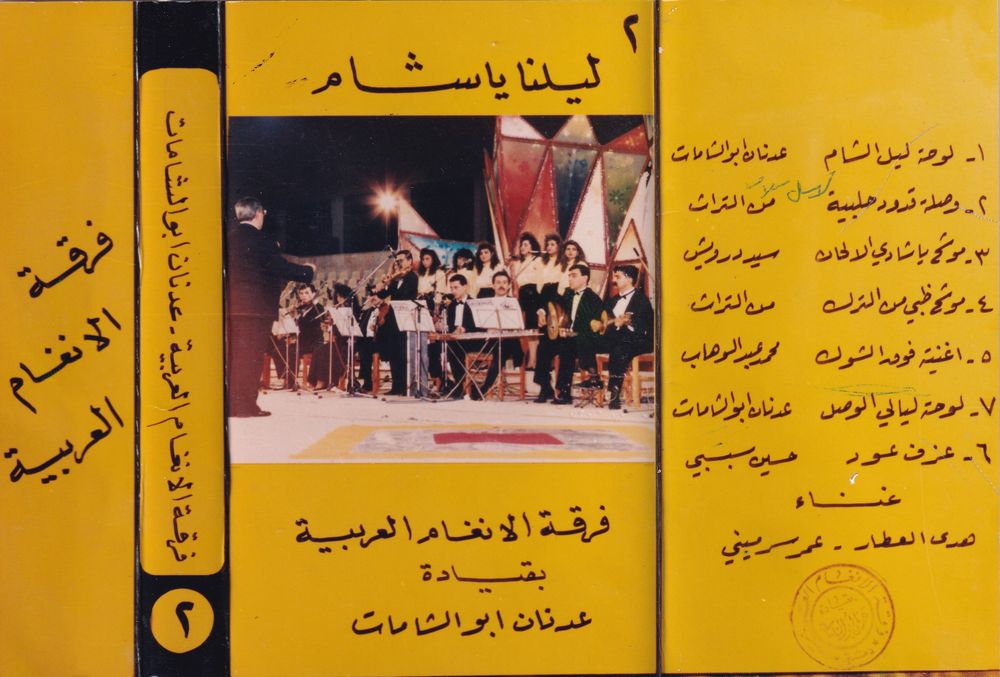




Adnan Abu Al Shamat
Laylouna Ya Sham (Our Night, Oh Sham)
SIDE A
- Laylouna Ya Sham (Our Night, Oh Sham)
- Arsel Salami La Salem (Send My Greetings To Salem)
- Beqalbi Hasra Wa Nazra (There is a Sigh and a Gaze in My Heart)
- Ya Shadi Al Alhan (Oh, Singer of Melodies)
- Zabyoun Min Al Turk (A Gazelle of the Turk)
- Raqset Setty (The Dance of My Grandmother)
SIDE B
- Hajany Al Shawq (The Longing Excited Me)
- Sama'y Sega (Sama'y Sega)
- Oumar Sarmini &Huda Al 'Attar: Anta Al Hawa (You Are The Love)
- Oumar Sarmini &Huda Al 'Attar: Layali Al Wasl (The Nights of Bonding)
- Oumar Sarmini &Huda Al 'Attar: (I Started To Complain To My Night About Him)
- Oumar Sarmini &Huda Al 'Attar: Nahnu Allazeen (We Are the Ones Who)
Location Issued
Damascus, Syria
Artist Origin
Damascus, Syria
More Info
On this cassette, we hear a variety of musical pieces, including muwashahat, qudoud, and traditional heritage songs, along with several instrumental pieces, performed by the Al Angham Al Arabiyya Ensemble, under the direction of the artist Adnan Abu Al Shamat. Among these compositions are Muwashah Ya Shadi Al Alhan, the song Laylouna Ya Sham, and the song Beqalbi Hasra Wa Nazra, and the famous musical piece Raqset Setti.
Adnan Abu Al Shamat (1934-2011), a native of Damascus, began his musical studies at the age of sixteen. In 1950, he enrolled in the Eastern Musical Institute in Damascus and graduated in 1954. There, he received a comprehensive musical education from renowned musicians. He studied musical notation and rhythm with Hassan Derkazalli, solfège with Ilya Sermandes, and muwashshahat with Saeed Farhat. He also learned Eastern melodies and maqamat from Yahya Al-Saudi, oud from Fouad Mahfouz and Muhammad Al-Nahhas, and double bass from Felix Khoury. Additionally, he studied the Samah dance under Abdul Wahab Safi and musical literature with Nassif Al-Ikhtyar.
In Aleppo, Al Shamat took his first steps in composition, creating music for singers at Radio Aleppo. He also composed twelve songs for Sabah Fakhri, including muwashshahat and poems. In 1989, he founded the Arabic Melodies Orchestra, which he conducted. These performances can be heard on this recording. The orchestra's mission was to showcase Arab musical heritage, with a particular focus on Syrian traditions, while also presenting Abu Al Shamat’s own compositions—an extension of this rich heritage.
The orchestra gained significant popularity both locally and across the Arab world. It participated in the Mahba Festival for several years, as well as the Arab Music Festival in Cairo in 1993 and 1998, performing at the Cairo Opera House. In 1995, it took part in the Testour Festival for Malouf in Tunisia and held several concerts there. Additionally, the orchestra performed extensively in various cities across Syria.